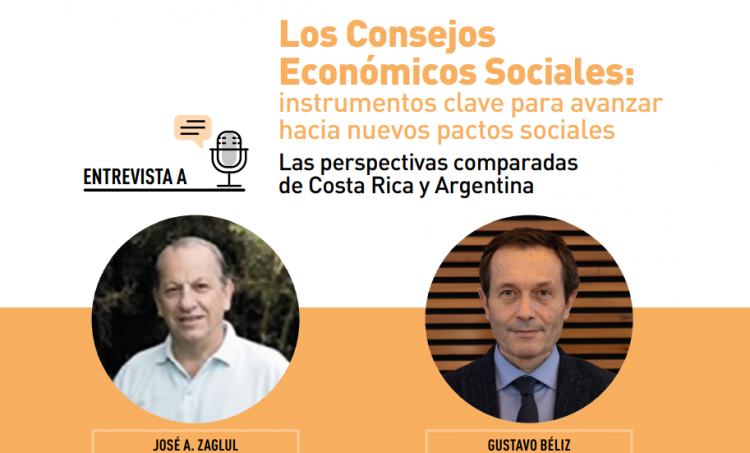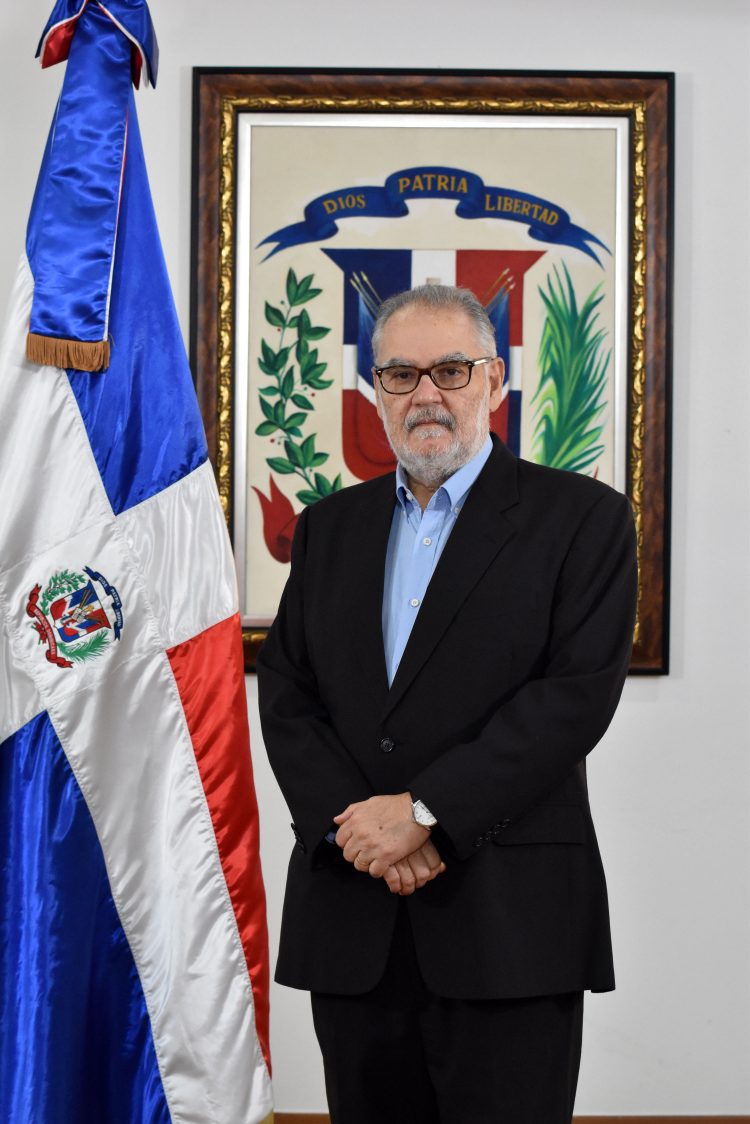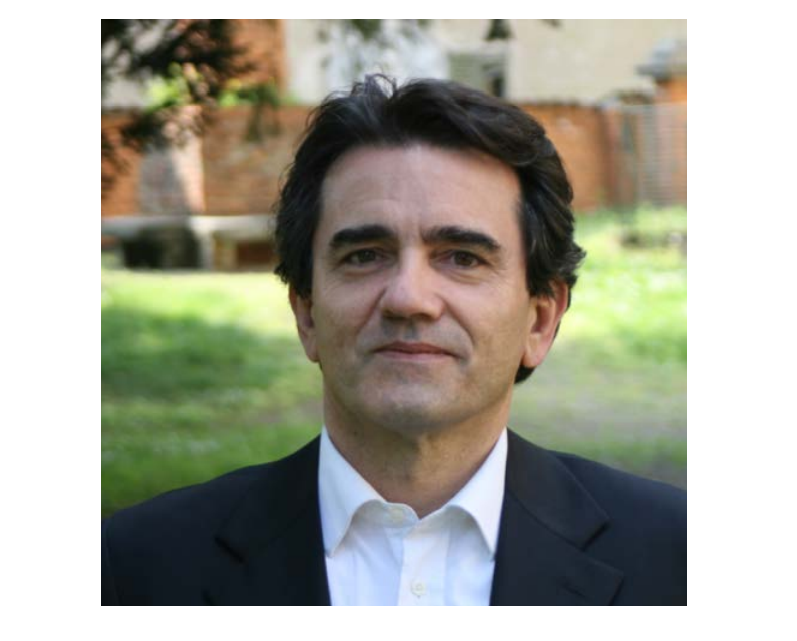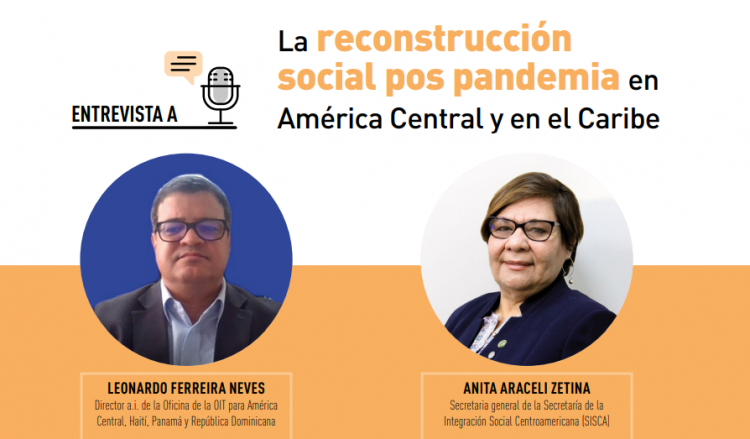Recíprocamente talked to José A. Zaglul and Gustavo Béliz, presidents of two recently created Economic and Social Councils in Costa Rica and Argentina, to learn their points of view of possible roles of these dialogue and consensus bodies when promoting social dialogue and strengthening democracy.

Interview by por Francesca Capparucci, project technique, Virginia Tedeschi, Southern Cone local technician, from Social Policies Area, EUROsociAL+ Programme
José A. Zaglul was President of EARTH University since its inception in 1989 until his retirement in December 2016. Dr. Zaglul was the former head of the Animal Production Department at the Centre for Tropical Agricultural Research and Training (CATIE) in Costa Rica, and served as professor and vice-rector of research and extension at the Costa Rican Institute of Technology (TEC). He has been nominated three times for the Nobel Peace Prize.
Gustavo Béliz is the secretary of Strategic Affairs of the Office of the Presidency of the Republic of Argentina. He was director of the Institute for the Integration of Latin America and the Caribbean (INTAL) at the Inter-American Development Bank (IADB). He was twice Minister in the National Cabinet (Interior and Justice, Security and Human Rights) and twice Secretary of the Office of the Presidency of the Nation (Public Management and Strategic Affairs) in three different national governments.
In your country, what is the role of the Economic Social Council for social dialogue, that is, to move towards a new social pact?
Zaglul: The Economic and Social Advisory Council of Costa Rica broadly represents the most diverse sectors of the population. This creates an opportunity for discussion, negotiation and consensus building among numerous stakeholders, such as workers, employers, academia and civil society. At the same time, it poses the great challenge of making everyone represented satisfied with the results of the dialogue and negotiation process. This challenge has been addressed when defining the mission and strategic purpose of the CCES of Costa Rica, whose priority is the well-being and development of our society. The benefit of one sector cannot be imposed to the detriment of the welfare of the country. I believe that through constructive dialogue our goals of peace and prosperity for all can be achieved.
Belize: One of the basic objectives of the CES is to collaborate in the construction of the culture of the encounter. This is what we have proposed since its creation, and we make progress from a broad and diverse call, with the participation of the business world, organised workers, social movements, the scientific-technological system and universities. The Council works responsibly, beyond short-term power bids, on the joint development of action plans that lead to the design of state policies. We need to make progress with a new social pact that understands that no one has a magic or automatic recipe to overcome the structural problems in Argentina. We need to reach common diagnoses, listen to different voices and achieve syntheses that signify specific action steps, proposals, mobilising experiences, shared medium and long-term strategies. This Council is united but with very different views, origins and heterogeneous positions, and in that diversity lies the richness of this space.
What are the strategic reforms in which the government and the legislative assembly would like to involve the Economic and Social Council for a participatory definition of said reform?
Zaglul: At this time, an ambition common to the executive and the council members has to do with the conversion of the current presidential decree that creates the Council in a law of the Republic that lasts over time and becomes a bridge between the executive, the legislative assembly and the living forces of the country represented in the CCES. It is clear that the decisions of the CCES are consultative and not binding on the executive, but they are extremely valuable and influential to strengthen democracy and social peace. Within this framework, during the months of April to June 2021, meetings were held with the different sectors and populations that make up the CCES, and among converging topics of interest like poverty, employment and education – particularly relevant in the post-Costa Rican pandemic scenario. He highlighted the shared need for an economic reactivation based on public policies aimed at fiscal stability, attracting investment, local employment and economic growth.
Belize: The Council has been involved in crucial debates for development in Argentina. We are making progress in the discussion of a new energy matrix for the country (National Hydrogen Strategy 2030). We convened a broad debate on the future of work, which generated 50 proposals. We promoted Argentina’s adhesion to the Pact for Information and Democracy and agreed to a joint declaration to support changes in the international financial architecture, in line with global proposals to channel Special Drawing Rights (SDRs) from developed countries to medium and low income countries. A national contest was called to support pilot experiences to make it possible to establish settlement in the interior of Argentina. In terms of democratic innovation, we are relaunching the government administrators programme, creating a public works observatory to ensure transparency and promoting the design of a new code of ethics for the judicial function.
In Costa Rica, as you said, the broad representation of sectors and interests within the Council poses a challenge. How do you reconcile this plurality of sectors and interests represented with the effectiveness of the work of the CES?
Zaglul: the broad, diversified representation of sectors of the population in the CCES of Costa Rica, as well as a challenge, is an excellent opportunity to resolve and mediate between differences through dialogue and negotiation. An essential starting point is to understand that diversity is the wealth and progress of a society. Different points of view, when viewed respectfully and with the ability to listen, enrich our opportunities for advancement. A key element of success, to reach agreements, are essential values of human beings such as respect, ethics, integrity, honesty and patience; through them, it is possible to show respect for one another, an open mind and humility to accept other points of view, as well as a willingness to sacrifice part of personal interests for the general good. At the same time, it will also be essential that the CCES be endowed with a regulation that streamlines and enables conciliation between the different interests. We will devote ourselves to this in the coming weeks.
Through EUROsociAL+ it was demonstrated how some European Economic and Social Councils are structured and how they work. Which of the lessons learned do you think could or should be drawn from the European experience, based on the ongoing process in Argentina?
Belize: We have a lot to learn from the European experience in this matter, because Europe has a long tradition with these kinds of collegiate bodies that promote agreements and consensus. These experiences show us that the creation and formalisation of this type of organisation serves to institutionalise dialogue, establish priorities and draw common horizons in diversity. Therefore, the councils become excellent spaces for public-private dialogue, agreeing to public policies and the debate between diverse stakeholders in society. Beyond the characteristics of each specific council, of the binding or declarative powers, it seems important to me to highlight the spirit that led post-war Europe to create spaces of social cohesion amid rubble, death and horror. The main task of any council is to work for social cohesion and ensure well-being, bringing positions closer and avoiding harmful polarisation. This horizon, present in the genesis of the European councils, maintains its validity and our country must incorporate it to consolidate our beloved Argentina. As Pope Francis says, a new and better beginning for humanity is possible in the post-pandemic world. To do that, we must work together and with haste. This publication is an important step in that direction.



